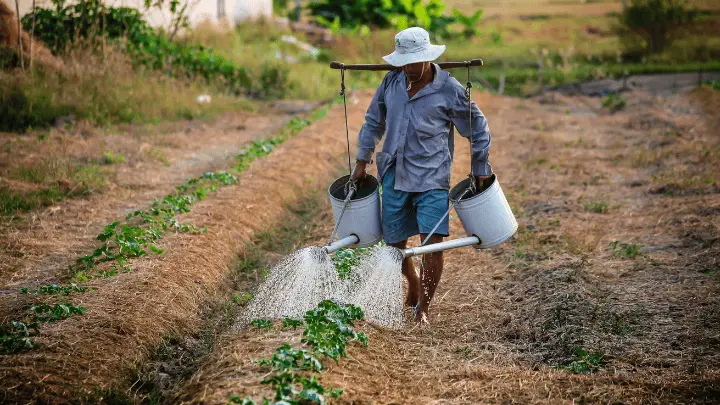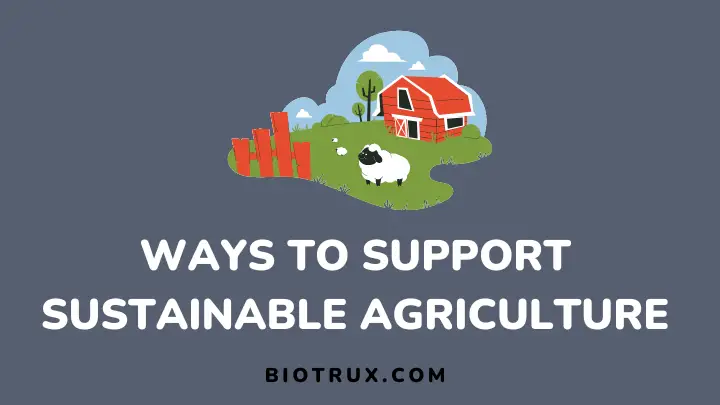Sustainable agriculture has become a buzzword recently as the world grapples with environmental issues and global food security. This innovative farming system aims to balance the three key elements of sustainability – economic, environmental, and social.
Producing healthy food while protecting the environment, treating animals well, and ensuring fair working conditions for farmers is the goal of sustainable agriculture.
The best part? You don’t have to be a farmer to support sustainable agriculture. You can contribute to this movement in many simple ways, which will be shared in this article. You’ll also explore some related questions on sustainable agriculture.
Read on to learn more.
What Exactly is Sustainable Agriculture?
Sustainable agriculture produces food that attempts to preserve or improve soil fertility and protect the environment. It also aims to improve social and economic well-being for current and future generations.
Sustainable agriculture reduces nonrenewable resources like synthetic fertilizers and pesticides and reduces soil erosion and water pollution. It encourages biodiversity and soil health and implements techniques that benefit farmers and consumers.
Long-term sustainability and ethical considerations are at the forefront of sustainable agriculture, making it a viable alternative to current industrial agricultural practices.
Sustainable agriculture offers a more comprehensive and responsible approach to food production by prioritizing the health of the environment and the economy.
5 Ways to Support Sustainable Agriculture
1. Reduce food waste
Food waste is a massive global problem, contributing to economic losses and environmental degradation. You can support sustainable agriculture by minimizing food waste in your own life.
Plan your meals, store food properly, and get creative with leftovers. Consider composting your food scraps to help replenish the soil instead of adding to landfills.
2. Buy locally and seasonally
Shopping locally and seasonally is one of the simplest ways to support sustainable agriculture. Buying from local farms helps to lessen the carbon footprint of long-distance transportation. It also promotes regional food diversity and the local economy.
Seasonal produce is frequently more nutritious and fresher and uses fewer resources to produce. So, make it a point to go to your local farmers’ market and enjoy the season’s flavors.
3. Advocate for sustainable farming policies
Get involved in local and national discussions about sustainable farming policies. Advocate for regulations that encourage sustainable practices, support small-scale farmers and protect natural resources.
You can join or support organizations dedicated to sustainable agriculture and amplify their efforts to influence policy changes.
4. Grow your own food
You can grow some of your food, whether you have a sprawling backyard or a tiny balcony. Home gardening allows you to control what goes into your produce and connects you with the joys of nurturing plants. Even growing a few herbs or tomatoes in pots can make a difference.
5. Proper education and awareness
Education and awareness are critical in promoting sustainable agriculture. We can safeguard the environment, preserve natural resources, and encourage crop development by teaching people the value of sustainable agricultural practices.
Including children in this process is critical because they are our planet’s future. We can inculcate in them a feeling of environmental responsibility.
This can encourage them to make environmentally conscious decisions in the future by teaching them about sustainable agriculture. Education and awareness can create a more sustainable and healthy world for ourselves and future generations.
Does Sustainable Agriculture Make a Difference to the Environment?
Yes. Sustainable agriculture is a game-changer when it comes to protecting the environment. Unlike conventional farming methods, which often rely heavily on synthetic chemicals and extensive land use, sustainable agriculture practices prioritize eco-friendliness.
Here are a few ways sustainable agriculture benefits the environment:
- Reduced chemical use: Sustainable farming practices prioritize using natural and organic pest control and fertilization methods. This helps to minimize the use of harmful chemicals, which can pollute soil and water.
- Conservation of biodiversity: Sustainable agriculture supports biodiversity and crucial pollinators like bees through diverse cropping systems and natural habitat preservation.
- Soil health: Sustainable practices aim to maintain soil fertility across generations by utilizing crop rotation and cover cropping.
- Water management: In sustainable agriculture, it is important to use water efficiently, reduce water wastage, and prevent water bodies from becoming contaminated.
In short, sustainable agriculture isn’t just good for the environment; it’s essential for mitigating today’s environmental challenges.
Is Sustainable Agriculture Achievable in Developing Countries?

Yes. Sustainable agriculture is attainable and necessary for developing countries. These areas may be more vulnerable to food scarcity and environmental degradation. Here are some of the reasons why sustainable agriculture is feasible in developing countries:
- Resource efficiency: In the long run, sustainable farming practices often demand fewer resources. This can greatly benefit areas with limited resources, such as water and arable land.
- Resilience: Sustainable agriculture practices such as crop diversification and organic farming can help small-scale farmers cope with the potential effects of climate change and unpredictable weather patterns.
- Food security: Sustainable agriculture contributes to food security by increasing soil fertility and decreasing reliance on costly synthetic inputs.
- Community empowerment: Community-based approaches to sustainable agriculture are frequently promoted, empowering local farmers and communities to take responsibility for their food supply.
Developing nations may need help in adopting sustainable practices. However, countless success stories show that it is doable and beneficial to their economies, environments, and people.
Why Does Sustainably Produced Food Appear to be More Costly??
There is a common belief that sustainable agriculture results in higher food costs. Although it may be true that sustainably produced food is occasionally more costly than conventionally produced food, there are legitimate reasons for this price disparity.
- Lower yields: Sustainable agriculture prioritizes long-term soil health over short-term gains, often resulting in slightly lower yields than conventional methods.
- Labor-intensive: Sustainable farming involves more manual labor due to organic weed control, diversified cropping systems, and careful management.
- Certification costs: Certification processes are in place to ensure sustainable food production, which may increase administrative costs.
- Market demand: As the demand for sustainably produced food grows, economies of scale will likely kick in, potentially reducing the price gap.
When it comes to choosing what to eat, the impact goes far beyond just satisfying your hunger. Sustainable food choices benefit your health and play a crucial role in supporting a healthier planet and global food system.
FAQs
Can you practice sustainable agriculture in your backyard?
Yes. Sustainable practices can be scaled down for small-scale backyard gardening. Techniques like composting, mulching, and using natural pesticides can contribute to sustainable agriculture in your green space.
What are some common sustainable farming practices?
Common sustainable farming practices include crop rotation, cover cropping, organic farming, reduced chemical use, agroforestry, and responsible water management.
What is the difference between organic and sustainable farming?
Organic farming doesn’t allow synthetic chemicals, while sustainable farming takes a wider approach to long-term environmental and social responsibility. It is possible for sustainable farming to be certified organic or not.
How can you support sustainable agriculture as a consumer?
Supporting sustainable agriculture is as easy as making conscious choices when you shop for food. Look for certifications like USDA Organic, Fair Trade, or Rainforest Alliance, and try to buy locally sourced, seasonal produce to reduce your carbon footprint.
Wrapping Up
In conclusion, supporting sustainable agriculture is crucial in securing our future. As a consumer, you have a powerful impact on the market by making informed decisions when purchasing food.
When you buy local and organic produce, you support small-scale farmers who use sustainable farming methods. This helps to reduce greenhouse gas emissions caused by long-distance transport.
Supporting agricultural policies that promote sustainable farming practices also has a significant impact. We must work together to promote education, awareness, and funding of sustainable agricultural practices.
We can help the environment and achieve a fair food system for everyone by following these farming practices that are healthy and sustainable. Remember, every decision you make counts and contributes to a better future for us and the planet.
You can also learn more about permaculture as a type of sustainable farming.
Thanks for reading.

